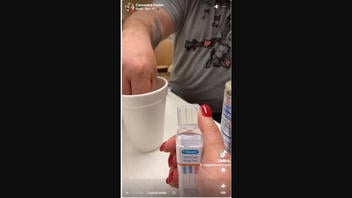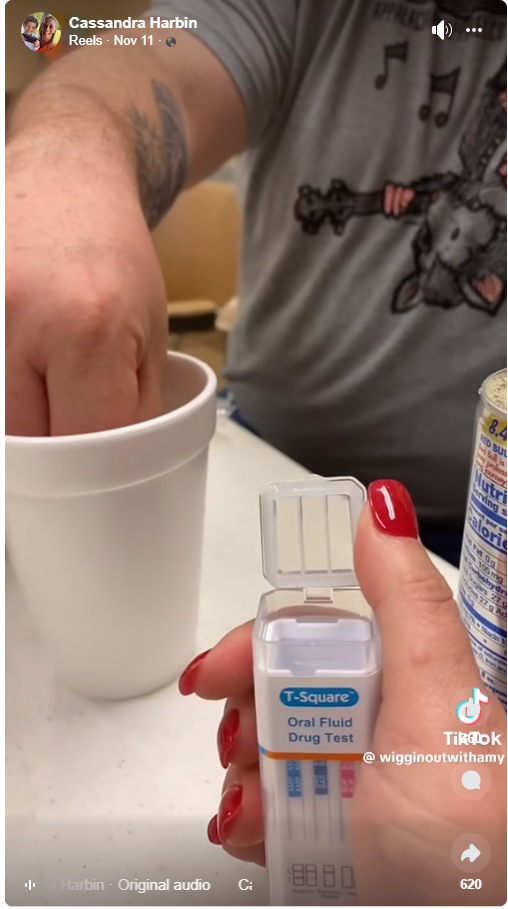
Does a video of a non-laboratory test using the T-Square brand oral fluid drug test prove that Red Bull energy drink contains the drugs buprenorphine and cocaine? No, that's not true: There is no way to confirm that the people featured in a video shared on social media used the drug test correctly and used an uncontaminated cup to hold the fluid being tested. The can from which the fluid was poured was already open at the start of the video, raising further questions of possible contamination. Furthermore, a disclaimer in the T-square product information packet explicitly stated that the test should only be used with human saliva and that it "provides only a qualitative, preliminary result."
A version of the claim originated in a 52-second clip shared to TikTok on November 6, 2023 (archived here). Below is how the post appeared at the time of this publication:
(Source: TikTok.com screenshot taken Mon Nov 13 07:47:00 UTC 2023)
In the video, the voices on the audio track claim that the fluid poured from an open Red Bull can tested positive for cocaine and for buprenorphine, a drug widely used for the treatment of opioid dependency.
The voices also say the test found Suboxone, which is a brand name for a buprenorphine-and-naloxone product made by Indivior, a pharmaceutical company.
A T-Square oral fluid test is a less-invasive and less-expensive method of detecting the presence of certain drugs in saliva. Though convenient and quicker than a lab-based test, there are inherent flaws with such saliva drug tests.
"Technological advances do allow on-site detection of drugs, but there are technical issues in relation to collection of oral fluid and in the variability of drug concentrations (of different drug types) in this fluid," wrote Olaf Drummer, a forensic pharmacologist and toxicologist at the Melbourne, Australia, Victorian Institute of Forensic medicine, in a 2006 analysis (archived here).
The test is meant to detect drugs in human saliva, not food products. The video in question does not exhibit the standardized process of collecting and testing oral fluid, nor was it evident that the test was administered properly.
For example, the pamphlet insert (archived here) that accompanied the tests directs users to bring the kit and specimen to room temperature and "put the sponge end of the collector in your mouth to collect oral fluid for about 7 minutes" Based on the 52-second clip, it's impossible to determine if these standardizations were meant.
There are also limitations to the test mentioned in the packaging insert, including that it only "only a qualitative, preliminary result" and requires a "secondary analytical method... to obtain a confirmed result."
Furthermore, the accompanying pamphlet also warned that "a positive test result does not indicate the concentration of drug[s] in the specimen or the route of administration.
The U.S. Department of Agriculture maintains extensive nutrient profiles on food products available in the U.S. like Red Bull drinks, which can be viewed here. CVS Pharmacy also listed an ingredient list for Red Bull, which includes:
Carbonated Water, Sugar, Glucose, Citric Acid, Taurine, Natural and Artificial Flavors, Sodium Bicarbonate (Baking Soda), Magnesium Carbonate, Colors, Caffeine, Niacinamide, Pyridoxine HCl (Vitamin B6), Calcium Pantothenate, Vitamin B12
Lead Stories contacted Red Bull and the China-based test manufacturer Guangzhou Wondfo Biotech Co., LTD. We will update this article should a response be received.
Lead Stories has looked into other claims about ingredients, finding that food additives found in Dairy Queen's soft serve are not harmful to the human body, that the laxative MiraLAX does not contain a chemical commonly used in antifreeze, and that Pepsi did not admit that its soda contains cancer-causing ingredients.


















